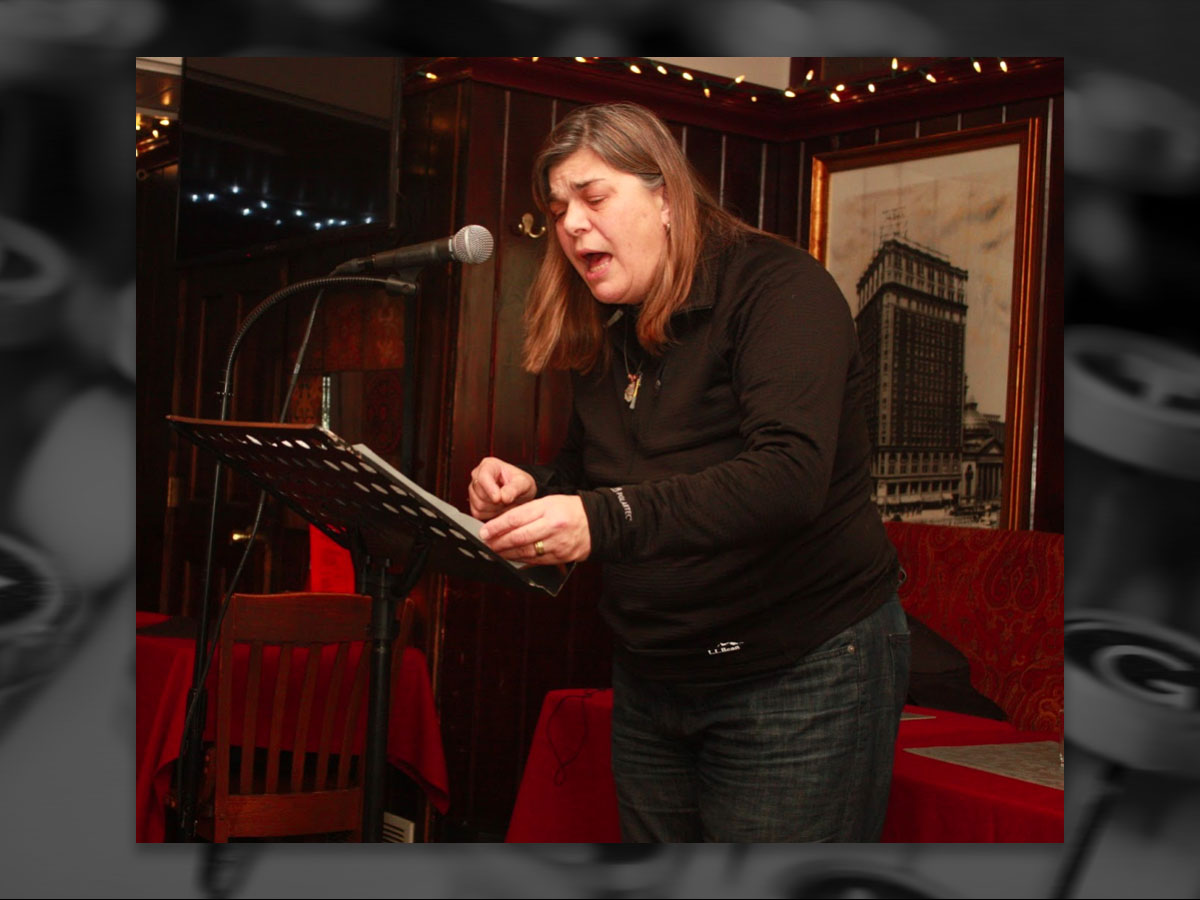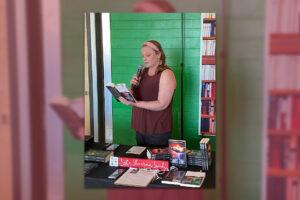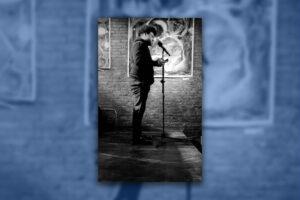Interview and Transcription by Karlie Flood – Intern
Edited for clarity by Courtney Galligan – Managing Editor
Nancy Klepsch is a published poet, an alum of the University at Albany and Saint Rose, co-host of 2nd Sunday @ 2 open mic, a literary figure that understands the importance community and lives in Troy, NY. Just one hour before her monthly open mic at the Arts Center of the Capital Region Klepsch openly admires her home city that has so much to offer to writers.
Nancy Klepsch: To live in Troy really does mean that you live a creative life; it can be in a public way or a mellow way. I would take all my poems and put them all around the telephone poles for four or five blocks to see if anyone paid attention to them. For a long time, I did a lot of installations here. I got funding from the city of Troy and the Albany Airport. Now, I do the 2nd Sunday open mic. Dan Wilcox and I started this about nine years ago. An executive director at the Arts Center in Troy, who was very visionary, noticed that there wasn’t any poetry—this was before Poetic Vibe. Dan and I noticed that there were two things missing: something for people who didn’t want to go to a bar at 8 pm or couldn’t. And two, there was no open mic for poetry and prose. We were the first ones to establish the first open mic for both, and that kind of made a difference in terms of who came, and I think what we contributed to the community was an opportunity for people to experiment or explore without the pressure of being a feature.
Karlie Flood: Does the 2nd Sunday host any featured poets?
NK: No. It’s always an open mic, always supportive, you read two poems or five minutes of prose. We always clap at the end. We have some really experienced writers, and almost every open mic we’ll have someone who has never read. I think that’s really important because who am I? If I had to say something, I am definitely the daughter—so to speak mythically—of Tom Nattell, who’s one of our deans here.
KF: We’re actually working on a feature about him. Did you know him well?
NK: I feel like I did. I did something really important with Tom. In the 80s, Tom worked for the Health Department. My best friend had been diagnosed with AIDS, and this was at a time when there was no cure and there was no hope. And I was young—I was in my 30s—and Tom really taught me the importance of social justice and poetry. We were fighting like hell for the living and mourning the dead. Tom was a crusader. Tom taught me that when the worst thing is happening in your life that you can make art out of it. I see myself as one of Tom’s mentees, and he taught me an enormous amount about the poetry community, and a lot about who I am. The best poem doesn’t always get published. You don’t become a poet to become famous. It’s about your personal best, and I also think it’s about making sense of the world through poetry. Taking your unique voice and your unique ideas and sharing them with other people and saying: I have a story to tell, do you feel this way too?
That’s why there is no feature, because of Tom. It’s a lot of what Troy is about. (references Little Pecks, the outdoor café we are sitting in). They made beauty from all the scraps and different found things and all the different dreams and hopes and desires that were left behind and I think that’s really important—I don’t know. I write about place a lot. The activity of place is important.
KF: Do you write about Troy a lot?
NK: Oh yeah. I’ve written a lot about Troy. I’ve gotten grants to write here. I feel blessed here. I just did a program with Danielle Colin through Troy Architecture Program, Poetry in Motion, where we got to do a scattered site poetry reading about motion, so we curated a bunch of poets and had that on one Farmer’s Market day. I once did a scattered site reading called Poems about Building, here, where I emulated the activity of advertising and made 12, 2-by 3-foot banners with a line, each of one of my poems. But because its Troy I got the Department of Pubic Works to work with me and let me have it 40 feet high on a building. What was really transformative for me in this process, I’ve done a lot of community work, like Tom taught me to, but I had a lifechanging event about 5 or 7 years ago—got sick and then got better—and when I was sick, I was thinking, “wow, what’s one of the things I didn’t do, that I would be really sad if I don’t get to do.” And that was the answer to the question when I did readings, do I have a book, and the answer was no. So, I started thinking about what that would be like.
KF: A book?
NK: A book. A book of my poetry. I took some workshops with Bernadette Mayor, which was getting a lot of notoriety around here, and that helped me to stretch my writing process. Because what happens to an angry, lesbian, poet when you’re not angry anymore and you want more content to write about? You take a class with the consummate teacher of writing prompts. You take a class with writing prompts, Bernadette is amazing with writing prompts, Bernadette is her own genre.
What was really transformative to me was that I was exploring the activity of ritual in poetry. And I discovered a poet who did that too. And I took 30 days to write a book based on rituals.
KF: What do you mean by ritual?
NK: Like making up practices in terms of spirituality and things like that, and then using that and getting into the zone and meditating. That’s a big part of how I’ve been writing these days, doing a ritual. Maybe its collecting or doing some origin or giving thanks to the river or a private ritual. The class I took was with C.A. Conrad, with who I’m really enamored, he wrote some rituals for us. He does some amazing ones. One of my favorites is that he walks around the community with a picture of himself and he says, “Do you know who this guy is?” and he writes down the answers and makes them into poems. A lot of them are very healing based, though. One of the rituals that I like is that I make moon water, and if there’s a full moon, I’ll put a jar water out there and close it and use it as a blessing and then meditate and write poems. Or when there is an eclipse. I started doing it before I wrote my book, god must be a boogie man. It comes from Joni Mitchel and Charles Mingus song called “God must be a Boogie Man.” That’s the book I wrote through the activity of taking C.A.’s course while digging deep with a group of 20 online writers. The course was designed to break obstacles. I sent it out and I really wanted to get published. That was my dream. And a very small micropublisher in Troy, NY called Recto y Verso published me. Christian Ortega liked my book—he publishes experimental books. Now I need to set other goals and go do some readings.
I have a website now. That was something that Christian taught me right away, the minute he decided to publish my book, he came over very nervously and asked do you own your name? and I was like what are you talking about? And he asked again. What are you talking about? And he said, this may be a problem, and I said there’s only two Klepsch’s in the world. That was the first thing he taught me to do, so I own my name. I’m excited about that. And then he started showing me if you have a Smith or jones name—if your name is Vonnegut—it’s a problem.
(At this point Nancy shows me a quote from Jil Hanifan, located on the back cover of her book.)
Read these poems when you’re hungry, starving, famished – Nancy Klepsch’s kitchen is always warm and noisy, always full of fresh basil, pita, sweet potatoes, and spices. Read these poems when you think all might be lost, or you might be going crazy – these poems are full of tender rage and wild sanity. Shaman, musician, passionate warrior, “a brave hard mount/in a hard brave world,” the voice in this collection of poems will not be contained, speaks in chants and charts and recipes, documents the history of her city and our times, and the depth and urgency of these revelations, their searing humor and bite, are matters of survival and healing. Bending conventions and wielding typography like a dangerous paring knife, god must be a boogie man will feed you, heal you, and fight for your life. “Tell me a story,” Klepsch begs us, “Talk Forever.” – Jil Hanifan
“That kind of sums up who I am.”
KF: That’s beautiful.
NK: Jil also taught me to believe in myself as a writer, when I get stuck, when I just want to hang out with my friend, I call Jil. When I think my work is sucky and I need an honest opinion, when I need suggestions, when I need a kind voice, when I need to commemorate someone—one of the things that hard about older white woman lesbian—you become invisible. It’s a challenge. Another person that was important to my career—I used to read her books. Do you know Moseman? Laurie writes really experimental work, and she also influenced me. When I met Laurie and Jil, they were PhD students and I was just an undergraduate so to have them say, “Wow, we really like your work—” it really made me believe in myself.
(The following is the praise written by Moseman for Nancy’s book.)
“Gratitude, gut gratitude. Poet Nancy Klepsch know it because grief still scrapes the/soft palate [her] mouth/sews raw skin onto [her] teeth.From injury arises a poetic voice full of zing and verve. Klepsch’s rants are a rush of generosity: I am stir-frying joy/How much pleasure can mouth/bring to someone ordinary as a dinner.Her humor pokes fun at personal pronouns and big data: I am still incomplete a recovery agent’s small scale discovery that this machine my poor body is a prototype a meme more beautiful and alive that I ever was. But her gut is just. Her blues damn racial violence; her musicality offers an equality: all of us can stretch arc/kowtow to the catechism/of this river-scape/bob in its tidal/name waves/call the clouds cousin/round light snatch sunset. In a Collar City within the Rust Belt of this Queer Nation, Klepsch creates bright glimpses of how We fight for everyone. Experimental page-poets and spoken word bards will agree: god must be a boogie man is an invigorating read that demands a stage.” – Lori Anderson Moseman
NK: I like to dig deep into what I call the good, the stupid and the ugly of tech because one of the challenges is that no matter what you do with technology, there’s this great, great, great, great, great thing that it does and then it does this really bad thing. I have a poem called “my cells,” where I’m being chased, and I turn into a cyborg and I’m freaking out because how many times do you go to a place and they already know what you want. Or you go to Amazon and it says you bought these books, you may like this! No. I might’ve wanted that before but because operator system wanted me to want that, now I don’t want that. Even though it’s in my color and my size. There’s all this bad stuff, and it’s interesting how we manage that good, bad, and ugly. What I’ve been doing is technology to read more to access and then exploring this strange thing that I don’t know if I’m good at, but I see it in the work of Shira Dentz—the use of information in poetry.
KF: This is my last question. When did you know you were a poet?
NK: So, I was a little kid, I was in eighth grade, and I followed around Miss Fagen for 5 years, because you couldn’t take the poetry class until 12th grade. So, from 8th grade until 12th grade, this teacher tolerated me, but said that I have to wait until 12th grade. And finally, the day came: I was in Miss Fagen’s poetry class. I did my assignment and handed it in and I stayed after school because I couldn’t wait, and she said, “Why Nancy, I don’t think I have anything to teach you. You are already a poet.” We stayed friends for 35 years. She read all my poems. She was one of those really formative people, so that’s how I knew I was a poet. Because if Fagen said so had to be true.
A Note from the Editor: I had the pleasure of attending 2nd Sunday @ 2 for the first time on the same day that this interview took place. Nancy was a warm and welcoming co-host; after hearing her poetry and reading this interview I have found her to be an inspiration and hope to work with her in the future. Thank you for your time Nancy Klepsch!
You can find more information about this author at https://www.nancyklepsch.com/ and can purchase her book at https://www.amazon.com/God-Must-Be-Boogie-Man/dp/069299632X





